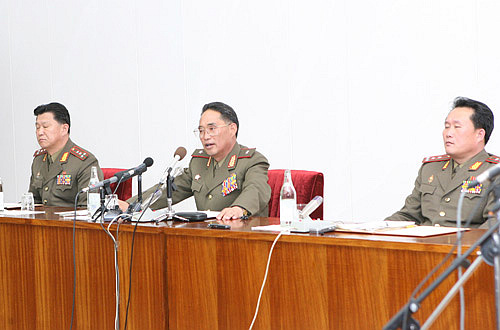|
 |
|
SPEAKING UP: Pak Rim Su (center), head of the Policy Bureau of North Korea's National Defense Commission, says at a Pyongyang press conference on May 28 that North Korea did not have anything to do with the sinking of Cheonan (ZHAO ZHAN) |
Lee Myung Bak's policies have led relations between North Korea and South Korea from strategic reconciliation to suspicion and confrontation. In this context, little wonder then the Cheonan incident proved a highly sensitive issue.
Points of contention
Forging a consensus on the political principles on reunification is one of the basic preconditions to peaceful relations between North Korea and South Korea. Without this, disputes would easily escalate into severe conflicts.
Take the demarcation of the sea border off the west coast of the Korean Peninsula for example. The 1953 armistice, while establishing a land military demarcation line between North Korea and South Korea, failed to delimit the sea border. Since islands in this area, including the Baengnyeong Island, are under South Korean control, the United States unilaterally drew a Northern Limit Line near Baengnyeong Island. North Korea did not accept the line. It instead proposed another sea borderline.
Following the adoption of the Agreement on Reconciliation, Non-aggression, Exchanges and Cooperation in 1991, the two sides went on to sign an annex to the agreement that included a provision about the Northern Limit Line. It said the two sides should not cross the line until a new sea border is established. Based on this provision, South Korea assumes North Korea has accepted the Northern Limit Line.
But the agreement reiterated in its preamble the three basic principles of reunification set forth in the 1972 Joint Communiqué, while "recognizing that their relationship, not being a relationship as between states, is a special one constituted temporarily in the process of unification."
In the chapter on reconciliation, it said the two sides should recognize and respect the political systems of each other, should not interfere in each other's internal affairs and should not slander or defame each other.
Given North Korea has accused Lee Myung Bak's policies of violating these central provisions of the agreement, the annex, of course, no longer makes sense to Pyongyang. That's why North Korea has reacted by nullifying the agreement.
The nuclear issue has been one of the major issues straining relations between North Korea and South Korea. While the two sides sought reconciliation after the Cold War, the United States, however, used the nuclear issue to hinder progress in inter-Korean relations.
Former George W. Bush administration scrapped the U.S.-North Korea Framework Agreement signed in 1994 to address the latter's nuclear program as well as the normalization of bilateral relations. It attempted to force Pyongyang to abandon its nuclear program in a thorough and irreversible way with a tough policy. The policy, however, prompted North Korea to conduct a nuclear test in 2006.
South Korean President Lee Myung Bak also took a hard-line stance, only to be rewarded with another nuclear test by North Korea in 2009.
Since the outbreak of the Cheonan incident, the United States and South Korea have almost ignored the nuclear issue. They instead engaged themselves in deliberating retaliation measures and sanctions and showing off military clout—actions that can only aggravate tensions. To date, the parties have yet to come up with any viable solutions. South Korea, moreover, has turned down North Korea's demand to examine evidence collected in the multinational investigation.
At the Asia Security Conference in Singapore in late May, defense ministers called on the parties not to resolve the current crisis on the Korean Peninsula through confrontation. To avoid new conflicts, leaders of both sides should continue to seek reconciliation—an approach that not only serves the interests of the two countries but also is conducive to the resolution of the Korean Peninsula nuclear issue.
The author is an associate research fellow at the China Institute of International Studies | 